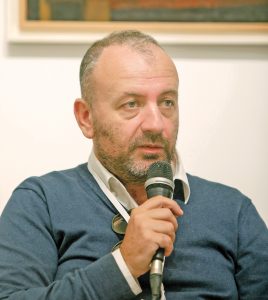The COVID-induced quarantine has only exposed such a factual situation, namely, there is no such thing as a new audience
In some future sociological almanacs, the year 2020 will be viewed as the end of popular culture, rather than as the history of contemporary art. It all started with the general democratization of the aforementioned culture, when the hipster movement of Brooklyn and Berlin, as the last social movement of aesthetics, allowed everyone to become a DJ or art photographer. Now, this ends with the impossibility to live life outside the online space.

Zlatko Crnogorac, Ex Art Producer
The digital world of on-demand platforms and social networks, on the other hand, has overdosed on choice and the rational use of time. Between billions of video views, pointless content from YouTube and Tik Tok, and millions of meaningless sentences and troll information on Twitter and Facebook, there are dozens of unseen feature films and Netflix and HBO series, as well as a few hundred unread books in an ever more receptive publishing production.
The COVID-induced quarantine has only exposed such a factual situation, namely, there is no such thing as a new audience, i.e. new kids whose interest will be piqued by institutions like Dom Omladine and SKC, as they did during the 1980s, or KC Grad, Parobrod and Mikser House, a festival in our time from the previous decade.
Unfortunately, the last instance of classical culture that had continuity and possessed an audience – that is the Serbian theatre – will suffer in the logical transition from acting and creative potential to television hyperproduction. To that extent, the tragic departure of Igor Vuk Torbica, who was able to reform not only domestic but also regional theatre and save it from the mediocrity and banality of the so-called celebs of the theatre subgenre, can be likened to lighthouses that are disappearing because there are no lighthouse keepers.
Also, the Serbian rock and roll has been long dead, while the moratorium on concerts and festivals will bring down not only that culture of living as such but also collateral entertainment as a venue of “creative industry”. At least during the 1990s, there was an alternative to musical pilgrimage to Budapest or Vienna.
Our children will be profiled musically, not even by the country road genre characteristic for ‘the establishments’ on the Ibar motorway, as much as by the IDJ trap influencers. If we are going to be happy, we should protect the “loud noise of rock ‘n’ roll” by law while there are still venues like the Bajloni ex-brewery and Cetinjska Street.
Last but not least – cinemas, or rather multiplex cinema theatres in shopping malls – will also go bankrupt amid the 2nd peak of the first coronavirus wave. Domestic feature films and small co-productions, even if they somehow survive (among the Telekom competition of TV series), will be made again, with the significant help of the state (the national film centes), for the needs of the showrooms of festival juries at B-category film festivals.
If we can count on such help from the Ministry of Culture in the future, the largest part of the domestic economy, the one that has been generating revenue for the fiscal budget for months, and maybe for a limited time in the future, cannot and will not be able to pay taxes and contributions. In a sanguine fashion, the fact that when there is no money, love (read project financing) is the first to go not only in the Ministry of Culture but also in the secretariats of culture in local governments, should be seen as the end of the simulation of independent scene culture whereby illusive non-governmental organizations, only recently formed by political parties, are used for money laundering.
In the end, and in the context of the huge real estate expansion in the Serbian capital and Novi Sad, the real question is when will the new financial-political elite begin to reinvest in contemporary art. Choosing an artist, like a prestigious winery, boils down to one gallery (‘November’) or the new popularity of graffiti artists like The Pianist – Andrej Josifovski, can only make the art scene more self-sustaining. But only when Ikea’s concept of apartment furnishing is replaced with a signature design of personal living space.
The new pending museum, marked for renovation, preservation of industrial cultural and archaeological heritage, spectacular retrospectives or events such as ‘Novi Sad – European Capital of Culture 2021’ will become a memory of the recent better past and what we could have done if there were more hours in a day.